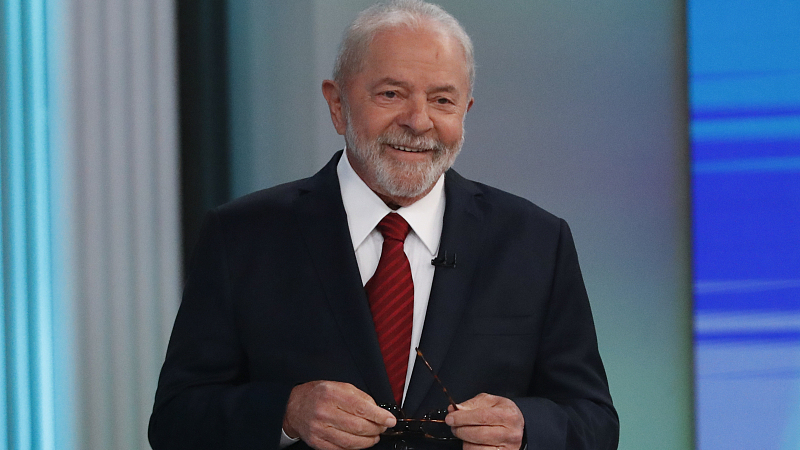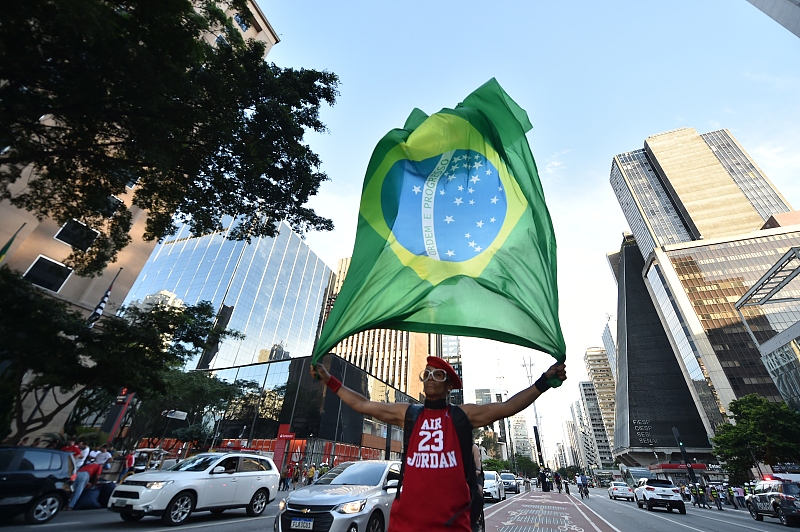
Brazil's President-elect Luiz Inacio Lula da Silva. /CFP
Brazil's President-elect Luiz Inacio Lula da Silva. /CFP
Editor's note: Alessandro Golombiewski Teixeira is a former Brazilian minister of tourism and former special economic advisor to the president of Brazil. The article reflects the author's opinions and not necessarily those of CGTN.
We just heard the results of the presidential election of the largest economy in Latin America – Brazil. The right-wing President Jair Bolsonaro lost to the former left-wing President Luis Inacio Lula da Silva, who won 50.9 percent of the votes.
As a Brazilian citizen, I feel happy that Western democracy still works, at least in Latin America, and we boot out a president that is responsible for the country's economic and social retrocession, an increase of violence, hatred and intolerance, a negative approach to COVID-19 resulting in more than 600,000 deaths. This election is crucial for Brazilians, as well as for the Latin American region and the world.
As the world is rapidly changing, Brazil will take its place in this new era where world power is changing hands. The economic and technological competition is becoming more intense and will leave no options for those who have no national development project and do not exercise their sovereignty and independence to take possession of the fantastic technological revolution that is already a reality.
For these reasons, it's important for a world power such as Brazil to emerge again as the voice for developing countries with active international participation that can represent the problems and the agenda of the less developed areas of Brazil. Next to China and other developing countries, Brazil is represented by its new leader (President-elect Lula) who can push forward poverty alleviation and rural revitalization, reduce hunger and income inequality, fight climate change and formulate a development plan for the so-called third world.

A supporter of Luis Inacio Lula da Silva waves a Brazilian flag during presidential runoff day in Sao Paulo, Brazil, October 30, 2022. /CFP
A supporter of Luis Inacio Lula da Silva waves a Brazilian flag during presidential runoff day in Sao Paulo, Brazil, October 30, 2022. /CFP
For Latin America, the election of President-elect Lula shows the possibility of a progressive government that would politically stabilize the region and promote coordination and cooperation in the region. In Lula's agenda, there is a priority for the regional integration, such as the Southern Common Market, or "Mercosur" in Spanish, and of dialogue between countries that form part of the economic community near the Andean region, something that Bolsonaro has ignored.
It is clear that there is a very high expectation for President-elect Lula's triumph. He represents the possibility of recovery by thinking about regional economic and social development through financing that guarantees the possibility of commercial exchange and with measures that enhance the possibilities for our Latin Americans. The election of Lula is an event that transcends Brazil and impinges on Pan-American balances.
With Lula's victory, the six largest economies in Latin America – Brazil, Mexico, Argentina, Chile, Colombia and Peru – will be governed by the left, not counting other countries, such as Honduras, Bolivia and Cuba. This means that economic and social development will be the center of the region's agenda. Cooperation and integration will be the cornerstone of the regional development process.
President-elect Lula is aware that the crisis linked to weak growth, the pandemic, trade difficulties due to the war in Ukraine, and increasing debt, has reduced the government's resources for social investments, while the states are expected to act as a promoter of development and social justice, creating a new strategic political reality in Latin America.
President-elect Lula knows from his own experience in Brazil, that the challenge of economic growth and unequal income distribution requires urgent structural reforms that oppose the dominant neoliberal model and the financial and rentier capital that sustains this model in Brazil. For Brazilians, this election has represented not only the return to Brazilian democracy but a chance to reconnect to a development path that was taken away six years ago. President-elect Lula is well aware of the historical responsibility for Brazilians, Latin Americans and the world.
(If you want to contribute and have specific expertise, please contact us at opinions@cgtn.com. Follow @thouse_opinions on Twitter to discover the latest commentaries in the CGTN Opinion Section.)